
Demographics of Wales include the numbers in population, place of birth, age, ethnicity, religion, and number of marriages in Wales.
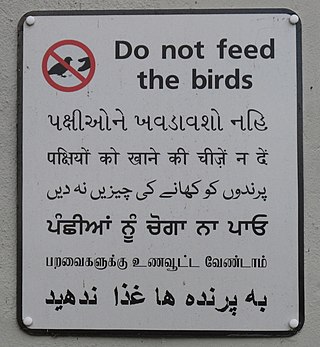
English, in various dialects, is the most widely spoken language of the United Kingdom, but a number of regional and migrant languages are also spoken. Regional indigenous languages are Scots and Ulster Scots and the Celtic languages, Irish, Scottish Gaelic, Welsh and, as a revived language with few speakers, Cornish. British Sign Language is also used. There are also many languages spoken by immigrants who arrived recently to the United Kingdom, mainly within inner city areas; these languages are mainly from continental Europe and South Asia.
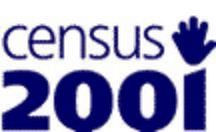
A nationwide census, known as Census 2001, was conducted in the United Kingdom on Sunday, 29 April 2001. This was the 20th UK census and recorded a resident population of 58,789,194.

The Welsh are an ethnic group native to Wales. Wales is one of the four countries of the United Kingdom. The majority of people living in Wales are British citizens.
The Cornish people or Cornish are an ethnic group native to, or associated with Cornwall and a recognised national minority in the United Kingdom, which can trace its roots to the Brittonic Celtic ancient Britons who inhabited Great Britain before the Roman conquest. Many in Cornwall today continue to assert a distinct identity separate from or in addition to English or British identities. Cornish identity has been adopted by migrants into Cornwall, as well as by emigrant and descendant communities from Cornwall, the latter sometimes referred to as the Cornish diaspora. Although not included as a tick-box option in the UK census, the numbers of those writing in a Cornish ethnic and national identity are officially recognised and recorded.
The United Kingdom is an ethnically diverse society. The largest ethnic group in the United Kingdom is White British, followed by Asian British. Ethnicity in the United Kingdom is formally recorded at the national level through a census. The 2011 United Kingdom census recorded a reduced share of White British people in the United Kingdom from the previous 2001 United Kingdom census. Factors that are contributing to the growth of minority populations are varied in nature, including differing birth rates and Immigration.

The demography of Scotland includes all aspects of population, past and present, in the area that is now Scotland. Scotland had a population of 5,463,300 in 2019. The population growth rate in 2011 was estimated as 0.6% per annum according to the 2011 GROS Annual Review.
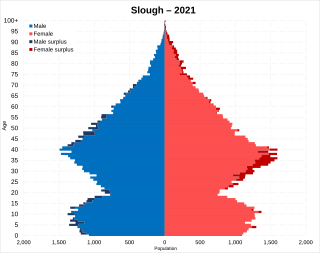
This article is intended to give an overview of the demography of Slough. In 2016, Slough had a population of 149,000 people.
A number of different systems of classification of ethnicity in the United Kingdom exist. These schemata have been the subject of debate, including about the nature of ethnicity, how or whether it can be categorised, and the relationship between ethnicity, race, and nationality.

Since 1922, the United Kingdom has been made up of four countries: England, Scotland, Wales and Northern Ireland. The UK Prime Minister's website has used the phrase "countries within a country" to describe the United Kingdom. Some statistical summaries, such as those for the twelve NUTS 1 regions of the UK, refer to Northern Ireland, Scotland, and Wales as "regions". With regard to Northern Ireland, Scotland and Wales particularly, the descriptive name one uses "can be controversial, with the choice often revealing one's political preferences".
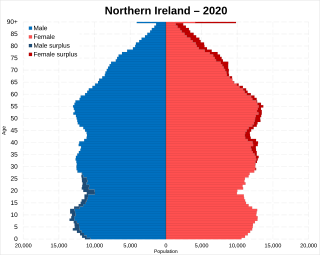
Northern Ireland is the smallest of the four components of the United Kingdom in terms of both area and population, containing 2.9% of the total population and 5.7% of the total area of the United Kingdom. It is the smaller of the two political entities on the island of Ireland by area and population, the other being the Republic of Ireland. Northern Ireland contains 27.1% of the total population and 16.75% of the total area of the island of Ireland.
The English people are an ethnic group and nation native to England, who speak the English language, a West Germanic language, and share a common history and culture. The English identity began with the Anglo-Saxons, when they were known as the Angelcynn, meaning race or tribe of the Angles. Their ethnonym is derived from the Angles, one of the Germanic peoples who migrated to Britain around the 5th century AD.
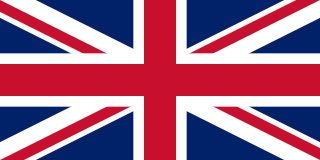
British people or Britons, also known colloquially as Brits, are the citizens of the United Kingdom, the British Overseas Territories, and the Crown dependencies. British nationality law governs modern British citizenship and nationality, which can be acquired, for instance, by descent from British nationals. When used in a historical context, "British" or "Britons" can refer to the Ancient Britons, the Celtic-speaking inhabitants of Great Britain during the Iron Age, whose descendants forming the major part of the modern Welsh people, Cornish people, Bretons and considerable proportions of English people. It also refers to citizens of the former British Empire, who settled in the country prior to 1973, and hold neither UK citizenship nor nationality.

Leicester, England is an ethnically and culturally diverse city. It is the thirteenth most populous city in the United Kingdom.

Luton, Bedfordshire, England is an ethnically and culturally diverse town of 203,201 people. It's primarily urban, with a population density of 4,696/km2 (12,160/sq mi). Luton has seen several waves of immigration. In the early part of the 20th century, there was internal migration of Irish and Scottish people to the town. These were followed by Afro-Caribbean and Asian immigrants. More recently immigrants from other European Union countries have made Luton their home. As a result of this Luton has a diverse ethnic mix, with a significant population of Asian descent, mainly Pakistani 29,353 (14.4%) and Bangladeshi 13,606 (6.7%).
White Polish is an ethnicity classification used in Scotland at the 2011 United Kingdom Census. In the census, the White Polish population stood 571,762 in the whole United Kingdom, 61,201 of which were in Scotland which was 1.16% of the total population of Scotland at the time.
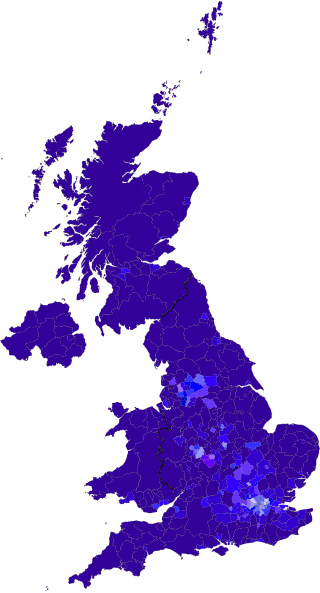
White people in the United Kingdom are a multi-ethnic group of UK residents who identify as and are perceived to be 'white people'. White people constitute the historical and current majority of the people living in the United Kingdom, with 87.2% of the population identifying as white in the 2011 United Kingdom census.
Mixed White and Black African people in the United Kingdom are a multi-ethnic and biracial group of UK-residents who identify with, or are perceived to have, both White and Black African ancestry.

Romani people have been recorded in the United Kingdom since at least the early 16th century. Records of Romani people in Scotland date to the early 16th century. Romani number around est. 225,000 in the UK. This includes the sizable population of Eastern European Roma, who immigrated into the UK in the late 1990s/early 2000s, and also after EU expansion in 2004. Romani people in the UK are considered part of the Gypsy, Roma and Traveller (GRT) community.
Gypsy, Roma and Traveller is an umbrella term used in the United Kingdom to represent several diverse ethnic groups which have a shared history of nomadism. The groups include Gypsies, defined as communities of travelling people who share a Romani heritage, resident in Britain since the 16th century; Ethnic Travellers, the traditional travelling people of Ireland and Scotland; and Roma, who are defined as recent Romani migrants from Eastern Europe. Although these groups' traditional lifestyles involved travel, most GRT people now live in houses or permanent caravan berths.













